New Kittredge Shakespeare Collection (25 vols.)
Digital Logos Edition
The New Kittredge Shakespeare series was a finalist in the New York Book Show.
Overview
Nearly 400 years after his death, William Shakespeare is still widely regarded as the one of the greatest English writers. His 38 plays, 154 sonnets, and other poems are some of the most influential literary works. His works survive in every major living language, and his plays are performed and adapted more than any other playwright’s. He wrote comedies, histories, tragedies, and romances, many of which are represented here in the New Kittredge Shakespeare Collection.
George Lyman Kittredge’s insightful Shakespeare editions have endured because of his eclecticism, his diversity of interests, and his wide-ranging accomplishments—all of which are reflected in the valuable notes in each volume. The plays in the New Kittredge Shakespeare series retain their original Kittredge notes and introductions, changed or augmented only when some modernization seems necessary. These new editions also include introductory essays by contemporary editors, notes on the plays as they have been performed on stage and film, and additional study materials.
The New Kittredge Shakespeare Collection is appropriate for all levels of coursework in a variety of subjects, including English, theater, Shakespeare studies, Renaissance literature, and film.

- 25 of Shakespeare’s world-famous plays in their complete Kittredge editions
- Extensive notes on contemporary and historical performances and adaptations of each play
- Kittredge’s original full glossary of peculiar and ambiguous phrases and terms
- A comprehensive timeline of major historical events with details from Shakespeare’s life
- Topics for discussion and a further study section
Even as the New Kittredge Shakespeare series glances back to George Lyman Kittredge’s student editions of the plays, it is very much of our current moment: The slim editions are targeted largely at high school and first-year college students who are more versed in visual than in print culture . . . There is no disputing the pedagogic usefulness of the New Kittredge Shakespeare’s performance-oriented approach . . . The volume is determined to eradicate any confusion that a first-time reader of the play might experience . . .
—Studies in English Literature, Tudor and Stuart Drama
It is good to have Kittredge’s editions—with his notes updated by respected scholars, new introductions, and suggestions on approaching the plays in performance—readily and inexpensively available.
—James L. Harner, professor of English, Texas A&M University
- Title: New Kittredge Shakespeare Collection
- Series: New Kittredge Shakespeare Series
- Series Editor: James H. Lake
- Publisher: Focus Publishing
- Volumes: 25
- Pages: 3,684
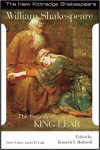
Based on the legend of Leir of Britain, a mythological Celtic king, King Lear tells the tale of Lear’s descent into madness after he divides his estate between his daughters based on the quality of their flattery—which he uses to determine their love for him. Widely regarded as one of Shakespeare’s highest achievements, King Lear captures the very nature of human suffering. This volume contains George Lyman Kittredge’s edition of the tragedy.
No man will ever write a better tragedy than Lear.
—George Bernard Shaw, Irish playwright
By adding comments on recorded performances to Kittredge’s notes . . . [which] were fun and helpful to my early study of Shakespeare . . . Kenneth Sprague Rothwell gives students and researchers the means to explore how performance can elucidate ‘the script’ of King Lear.
—Harry Keyishian, professor of English, Fairleigh Dickinson University
Kenneth Sprague Rothwell (1921–2010) was professor emeritus of English at the University of Vermont. He earned his MA and PhD in English and comparative literature from Columbia University. He taught at the University of Rochester, University of Cincinnati, and University of Kansas before becoming a department chair at the University of Vermont. His published works include Questions of Rhetoric, The Shakespeare on Film Newsletter, Shakespeare on Screen: An International Filmography and Videography, A History of Shakespeare on Screen: A Century of Film and Television, and articles which appeared in the Encyclopedia Britannica and the 2003 Blackwell Companion to Shakespeare Studies.
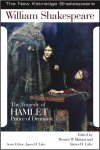
Hamlet is Shakespeare’s longest play. The highly influential work was based on the legend of Amleth, focusing on the revenge prince Hamlet unleashes on his uncle for murdering his father and marrying his mother. Hamlet exposes deep emotional pain and investigates human immorality.
. . . the world’s most filmed story after Cinderella.
—Arden Shakespeare Q2
Bernice W. Kliman (1933–2011) was the editor of The Enfolded Hamlets and coeditor of The Three-Text Hamlet and the New Kittredge editions of Hamlet, Romeo and Juliet, and Measure for Measure. In addition to books and articles on performance history, she published numerous notes and essays about the early history of editing. She was the coordinating editor of HamletWorks.org.
James H. Lake received his PhD from the University of Delaware and is a professor of English at Louisiana State University in Shreveport. He has also been appointed to the faculty of the Greco Institute. He has served as director of the LSUS Joys of Learning Humanities Seminars for the Elderly, director of the university’s honors program, and director of the LSUS Master of Arts in Liberal Arts program. He has served on numerous boards, including the Louisiana Endowment for the Humanities, the board of directors of the Noel Foundation, and the editorial board of Shakespeare and the Classroom. He has widely published on Shakespeare and film and edited the Focus on Performance edition of Christopher Marlowe’s Doctor Faustus.
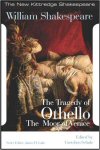
The Tragedy of Othello, the Moor of Venice
- Author: William Shakespeare
- Editor: Gretchen Schulz
- Series: New Kittredge Shakespeare
- Series Editor: James H. Lake
- Publisher: Focus Publishing
- Publication Date: 2011
- Pages: 152
The Tragedy of Othello, the Moor of Venice is based on the Italian short story, Un Capitano Moro by Cinthio, and follows the Moorish general Othello, as well as his wife, Desdemona, his lieutenant, Cassio, and his ensign, lago. The tale is full of deception and betrayal as lago schemes to destroy Othello’s marriage. With strong themes of racism, love, jealousy, and betrayal, Othello has remained a popular and relevant play since it was first published in 1565.
Gretchen Schulz is a professor emerita of English at Oxford College of Emory University where she taught Shakespeare and supervised student play productions for many years. She serves as resident scholar of the Atlanta Shakespeare Company. She has published and presented in multiple venues and worked with other Shakespeareans in two National Endowment for the Humanities Institutes and a year-long Folger seminar.
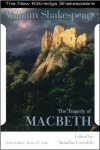
Loosely based on the real King Macbeth of Scotland, The Tragedy of Macbeth is Shakespeare’s shortest and one of his darkest tragedies. Inspired by the prophecy of witches, Macbeth murders the king of Scotland and seizes the throne. To cover his bloody tracks, Macbeth continues to murder anyone and everyone who gets too close to the truth. In some circles of theater, the play is believed to be cursed, and it’s title isn’t mentioned aloud.
Annalisa Castaldo received her PhD from Temple University and is an assistant professor of English at Widener. Her scholarly interests are performance studies and Shakespeare and popular culture. She is the fiction editor of the Shakespeares after Shakespeare reference work, which catalogs uses of Shakespeare in popular culture.
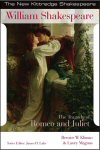
The Tragedy of Romeo and Juliet
- Author: William Shakespeare
- Editor: Bernice W. Kliman and Laury Magnus
- Series: New Kittredge Shakespeare
- Series Editor: James H. Lake
- Publisher: Focus Publishing
- Publication Date: 2008
- Pages: 182
The Tragedy of Romeo and Juliet was a part of a tradition of tragic romances, originally based on an Italian tale, which was translated into verse as The Tragical History of Romeus and Juliet by Arthur Brooke and later translated into prose in Palace of Pleasure by William Painter. Shakespeare built off these two works but added supporting roles and subplots—an early mark of his dramatic skill. The play focuses on the forbidden relationship between Romeo and Juliet—young lovers from feuding families. In addition to being one of Shakespeare’s most frequently performed and adapted plays, one of the measures of the play’s success is the archetypal use of its title characters in the romance literature that has followed.
Bernice W. Kliman (1933–2011) was the editor of The Enfolded Hamlets and coeditor of The Three-Text Hamlet and the New Kittredge editions of Hamlet, Romeo and Juliet, and Measure for Measure. In addition to books and articles on performance history, she published numerous notes and essays about the early history of editing. She was the coordinating editor of HamletWorks.org.
Laury Magnus earned her PhD at the Graduate Center of City University of New York and is a professor of English at the United States Merchant Marine Academy. She is a member of the editorial team of the forthcoming New Variorum Hamlet and HamletWorks.org. She teaches world literature and composition and independent studies in Shakespeare, literature and film, World War I literature, art history, modern literature, drama, and public speaking.
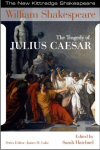
The Tragedy of Julius Caesar
- Author: William Shakespeare
- Editor: Sarah Hatchuel
- Series: New Kittredge Shakespeare
- Series Editor: James H. Lake
- Publisher: Focus Publishing
- Publication Date: 2008
- Pages: 142
While it is titled The Tragedy of Julius Caesar, the play follows the character of Marcus Brutus and the psychological conflicts between honor, patriotism, and friendship. The play is one of several written by Shakespeare based on true Roman events. The Tragedy of Julius Caesar portrays the conspiracy against Julius Caesar, his assassination, and the Battle of Philippi—where his betrayers are defeated. Shakespeare’s sources for the play were the biographies of Brutus and Caesar included in Plutarch’s Lives.
Sarah Hatchuel lectures in English at the University of Paris I Pantheon-Sorbonne and teaches “Shakespeare on Screen” at the University of Paris VII. She co-organized two conferences on the screen adaptations of Shakespeare’s plays at the University of Rouen, has published several articles on the aesthetics of Shakespeare on screen, and is the author of A Companion to the Shakespearean Films of Kenneth Branagh and Shakespeare, from Stage to Screen.
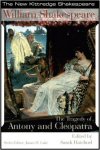
The Tragedy of Antony and Cleopatra
- Author: William Shakespeare
- Editor: Sarah Hatchuel
- Series: New Kittredge Shakespeare
- Series Editor: James H. Lake
- Publisher: Focus Publishing
- Publication Date: 2008
- Pages: 182
Based on historical biographies from Plutarch’s Lives, The Tragedy of Antony and Cleopatra portrays the relationship between Mark Antony and Cleopatra from the Sicilian revolt to Cleopatra’s suicide. Following the assassination of Julius Caesar, Mark Antony was one of the three men who ruled Rome before fellow leader and the story’s antagonist, Octavian, became the first emperor of Rome.
Sarah Hatchuel lectures in English at the University of Paris I Pantheon-Sorbonne and teaches “Shakespeare on Screen” at the University of Paris VII. She co-organized two conferences on the screen adaptations of Shakespeare’s plays at the University of Rouen, has published several articles on the aesthetics of Shakespeare on screen, and is the author of A Companion to the Shakespearean Films of Kenneth Branagh and Shakespeare, from Stage to Screen.
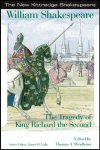
The Tragedy of King Richard the Second is the first part of a historical tetralogy, which some scholars refer to as the Henriad because of the three plays that followed Richard’s successors—Henry IV and Henry V. This play follows the last two years of King Richard’s life.
An extraordinary artistic achievement, Richard II remains one of Shakespeare’s most satisfyingly ambiguous plays and expertly-penned exercises in shifting audience sympathies. Pendleton’s even-handed introduction and judicious supplements to Kittredge’s annotations lay out the play’s issues in a way that make its delightful poignancy even more available to readers. Especially useful are Pendleton’s extensive in-text performance notes, which recount how film versions deal with the challenges and possibilities the play presents.
—James Wells, assistant professor, Muskingum University
Thomas A. Pendleton is a professor of English at Iona College in New York. He is coeditor with John Mahon of The Shakespeare Newsletter.
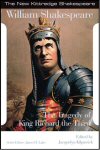
The Tragedy of King Richard the Third follows Richard III’s rise to power and short reign as king of England. It is Shakepeare’s second-longest play.
Jacquelyn Kilpatrick received her BA and MA from California State University Fresno and her PhD in literature from the University of California Santa Cruz. She has extensive experience teaching a broad range of literature, film, and drama, and her major field of research is Native American literature. She came to CSUCI from the Chicago area, where she taught English and directed the integrative studies program at Governors State University. She has also served as a Fulbright Senior Scholar in Spain.
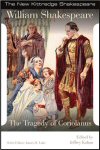
The Tragedy of Coriolanus
- Author: William Shakespeare
- Editor: Jeffrey Kahan
- Series: New Kittredge Shakespeare
- Series Editor: James H. Lake
- Publisher: Focus Publishing
- Publication Date: 2012
- Pages: 168
The Tragedy of Coriolanus dramatizes the life of the legendary Roman leader, Caius Marcius Coriolanus, based on his biography in Plutarch’s Lives.
Professor Jeffrey Kahan’s expertise in the history of Shakespearean acting complements Kittredge’s lucid [introduction and text] to create an edition of Coriolanus that centers modern readers in the play’s performance. Kahan’s introduction to the edition both recounts historical performances and carefully details recent directorial choices—choices that reappear in the course of his footnotes providing acting choices for key scenes. These notes, together with photographs of compelling performances, fix the reader’s imagination firmly in the midst of Shakespeare’s chilling theatrical portrayal of Republican Rome. This highly accessible edition will prove invaluable for actors, students, and lovers of Shakespeare.
—Cyndia Susan Clegg, distinguished professor of English, Pepperdine University
Jeffrey Kahan is a professor of English at the University of La Verne in California. He completed his PhD at the Shakespeare Institute of the University of Birmingham, England.
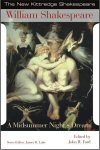
A Midsummer Night’s Dream
- Author: William Shakespeare
- Editor: John Ford
- Series: New Kittredge Shakespeare
- Series Editor: James H. Lake
- Publisher: Focus Publishing
- Publication Date: 2012
- Pages: 168
A Midsummer Night’s Dream is a comedy which tells of the adventures of young lovers and amateur actors, and their interactions with fairies. It takes place around the marriage of Theseus—the duke of Athens—and Hippoltya. It is one of Shakespeare’s most popular and most reproduced works.
John Ford teaches at Delta State University in Cleveland, Mississippi. He is the author of numerous books and articles on Shakespeare. In 2006, he was awarded the Excellence in Research Award from Delta State University.
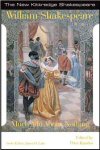
Much Ado about Nothing is a comedic play which follows two couples: Benedick and Beatrice, and Claudio and Hero. It is a generally joyful play which also delves into honor, shame, and court politics, and explores themes of deception and infidelity.
Peter Kanelos received his PhD from the University of Chicago and teaches at Loyola University of Chicago. He has taught at Stanford, is the editor of the New Variorum edition of Twelfth Night, and has published articles on Shakespeare, Montaigne, and Vasari. He was awarded a National Endowment for the Humanities Fellowship in 2004 for work at the Blackfriars Theater in Virginia and the Globe Theater in London.
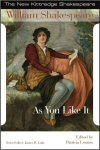
As You Like It is a comedy that tells the story of Rosalind, Celia, and Touchstone the court jester as they flee the court of Rosalind’s uncle. The play coined the phrase, “too much of a good thing,” and contains Shakespeare’s famous speech, “All the world’s a stage.”
Patricia Lennox received her PhD from the Graduate Center of City University of New York and teaches in the individualized study at New York University.
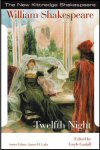
Twelfth Night, also known by the title, What You Will is a comedy that was written for the twelfth night of Christmas. It builds off the musical interludes and seasonal chaos that was expected of Christmas.
Gayle Gaskill offers appropriate tribute to G. L. Kittredge by updating his classic edition with a mastery, thoroughness, and verve worthy of the original. This excellent edition is marked by impeccable scholarship that everywhere displays careful attention to detail and keen sensitivity to the needs of modern readers.
—John W. Mahon, coeditor, The Shakespeare Newsletter
Gayle Gaskill is a professor of English at St. Catherine University in St. Paul, Minnesota. She has contributed articles to Who Hears in Shakespeare?: Auditory Worlds on Stage and Screen, The Merchant of Venice: Critical Essays, The Shakespeare Newsletter, and the Greenwood Companion to Shakespeare. Her reviews have appeared in Renaissance Quarterly and Cahiers Élisabéthains.
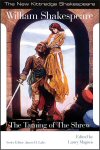
The Taming of the Shrew
- Author: William Shakespeare
- Editor: Laury Magnus
- Series: New Kittredge Shakespeare
- Series Editor: James H. Lake
- Publisher: Focus Publishing
- Publication Date: 2010
- Pages: 140
The Taming of the Shrew is a comedy which begins with a nobleman fooling a drunken commoner into believing he is a nobleman, and the play is then performed for his entertainment. The play itself focuses on Petruchio’s romancing of Katherina—the shrew. Katherina is rude and undesirable, but before her highly sought after sister Bianca can be married, Katherina must have a husband. While Bianca’s suitors seize every opportunity to win her favor, Petruchio uses psychological abuse to break Katherina’s fiery temperment until she becomes his compliant wife.
Laury Magnus’ edition of The Taming of the Shrew is much more than a revision of Kittredge. Her splendid introduction and appendices are sensitive to the play’s language and its paradoxical nuances of gender, and she understands that the play is, after all, a love story. Her explanatory notes are excellent, but most impressive and original is her emphasis on film, theater, and television performance.
—Maurice Charney, professor emeritus of English, Rutgers University
With its careful glosses and lively supporting essays on film and performance, this Taming of the Shrew provides the puzzled and the offended with a useful and intelligent guide to the possibilities of this play in a way that is historically informed yet alert to the pleasures of theater. The book does an especially fine job in its treatment of the Taylor and Zeffirelli film versions.
—Pamela Brown, professor of English, University of Connecticut, Stamford
Laury Magnus earned her PhD at the Graduate Center of City University of New York and is a professor of English at the United States Merchant Marine Academy. She is a member of the editorial team of the forthcoming New Variorum Hamlet and HamletWorks.org. She teaches world literature and composition and independent studies in Shakespeare, literature and film, World War I literature, art history, modern literature, drama, and public speaking.
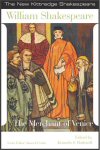
Merchant of Venice
- Author: William Shakespeare
- Editor: Kenneth Sprague Rothwell
- Series: New Kittredge Shakespeare
- Series Editor: James H. Lake
- Publisher: Focus Publishing
- Publication Date: 2008
- Pages: 128
The Merchant of Venice is a comedy which centers on a substantial loan which cannot be repaid and the dangers of promises. To help out his love-struck friend, Antonio the merchant attempts to borrow money from a Jew after publicly making anti-Semitic remarks. Shylock, the Jew, agrees against his better judgment to loan Antonio the money under one condition—if Antonio can’t repay the loan, Shylock demands to take one pound of his flesh instead. The scenes to follow are full of drama, comedy, and horror, culminating in a famous speech about mercy and resolution brought on by ingenious deception.
Kenneth Sprague Rothwell (1921–2010) was professor emeritus of English at the University of Vermont. He earned his MA and PhD in English and comparative literature from Columbia University. He taught at the University of Rochester, University of Cincinnati, and University of Kansas before becoming a department chair at the University of Vermont. His published works include Questions of Rhetoric, The Shakespeare on Film Newsletter, Shakespeare on Screen: An International Filmography and Videography, A History of Shakespeare on Screen: A Century of Film and Television, and articles which appeared in the Encyclopedia Britannica and the 2003 Blackwell Companion to Shakespeare Studies.
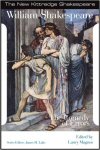
Comedy of Errors
- Author: William Shakespeare
- Editor: Laury Magnus
- Series: New Kittredge Shakespeare
- Series Editor: James H. Lake
- Publisher: Focus Publishing
- Publication Date: 2011
- Pages: 122
The Comedy of Errors is Shakespeare’s shortest play. Full of farces, puns, and slapstick humor, the brief play was designed to purely entertain. It is also one of Shakespeare’s only two plays that follow Aristotle’s classical unities. The story follows two sets of identical twins who were separated from their twins at birth. When one pair runs into the families of their brothers, the mistaken identities and chaos begins.
Laury Magnus earned her PhD at the Graduate Center of City University of New York and is a professor of English at the United States Merchant Marine Academy. She is a member of the editorial team of the forthcoming New Variorum Hamlet and the website, hamletworks.org. She teaches world literature and composition and independent studies in Shakespeare, literature and film, World War I literature, art history, modern literature, drama, and public speaking.
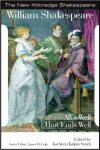
All’s Well That Ends Well is a play of uncertain classification. It has often been declared a comedy, though containing elements of both tragedy and comedy, it doesn’t truly fall under either category and is often called a “problem play.” Focusing on the relationship between Bertram and Helena, the play is full of grief, deception, often one-sided romance, and trickery.
Adding entirely new annotations to the text, providing a lucid overview of the play’s production history, concluding with an instructive essay on a theatrical understanding of reading plays, and illustrated with suggestive film stills throughout, Kathleen Kalpin Smith’s All’s Well that Ends Well is a welcome edition to the New Kittredge Shakespeare series, richly setting the play in the context of stage and screen performance.
—W. B. Worthen, Alice Brady Pels Professor in the Arts, Barnard College, Columbia University
Kathleen Kalpin Smith is an assistant professor of English at the University of South Carolina Aiken. She received her PhD and MA in English from the University of California at Davis.
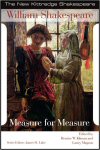
Measure for Measure
- Author: William Shakespeare
- Editors: Bernice W. Kliman and Laury Magnus
- Series: New Kittredge Shakespeare
- Series Editor: James H. Lake
- Publisher: Focus Publishing
- Publication Date: 2012
- Pages: 144
Measure for Measure is often regarded as a comedy, though some critics prefer to classify it as one of Shakespeare’s “problem plays.” It dramatically captures the issues of mercy, justice, and truth, and how they each interact with pride and humility, or as the play puts it, “Some rise by sin, and some by virtue fall.”
This most problematic of Shakespeare’s plays, a comedy filled with dark corners, has been beautifully presented by Laury Magnus and the late Bernice Kliman. Scholars will admire their editorial skill while students will benefit greatly from their ample notes, useful timeline of the play’s plot, and cogent performance history. As the editors explain, the fiercely interlocked themes of the play—sex, money, justice, and religion—make this play a measure not only of Shakespeare’s time but of our own.
—Anthony DiMatteo, professor of English, New York Institute of Technology
Bernice W. Kliman (1933–2011) was the editor of The Enfolded Hamlets and coeditor of The Three-Text Hamlet and the New Kittredge editions of Hamlet, Romeo and Juliet, and Measure for Measure. In addition to books and articles on performance history, she published numerous notes and essays about the early history of editing. She was the coordinating editor of HamletWorks.org.
Laury Magnus earned her PhD at the Graduate Center of City University of New York and is a professor of English at the United States Merchant Marine Academy. She is a member of the editorial team of the forthcoming New Variorum Hamlet and the website, hamletworks.org. She teaches world literature and composition and independent studies in Shakespeare, literature and film, World War I literature, art history, modern literature, drama, and public speaking.
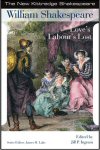
Love’s Labour’s Lost
- Author: William Shakespeare
- Editor: Jill P. Ingram
- Series: New Kittredge Shakespeare
- Series Editor: James H. Lake
- Publisher: Focus Publishing
- Publication Date: 2012
- Pages: 163
Love’s Labour’s Lost tells the comical struggle of the King of Navarre and his three noble companions as they try to maintain their oath of devotion to study and abstinence from women while they fall in love with a princess and her three ladies.
This student-friendly edition of a difficult play includes a clear, helpful introduction and notes elucidating the complicated imagery and wordplay. Notes and illustrations refer the reader to various staging options enabling him or her to imagine Love’s Labour’s Lost in performance.
—Katharine E. Maus, James Branch Cabell Professor of English Literature, University of Virginia
Jill P. Ingram is an assistant professor of Shakespeare and Renaissance literature at University of Ohio. She received her PhD in English from the University of Virginia and is the author of the book Idioms of Self-Interest: Credit, Identity and Property in English Renaissance Literature. She has also published many articles on English Renaissance culture and literature.
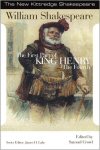
The First Part of King Henry the Fourth
- Author: William Shakespeare
- Editor: Samuel Crowl
- Series: New Kittredge Shakespeare
- Series Editor: James H. Lake
- Publisher: Focus Publishing
- Publication Date: 2009
- Pages: 140
The First Part of King Henry the Fourth covers a one-year period the reign of King Henry IV from 1402–1403, beginning with Hotspur’s battle at Homildon against the Douglas and ends with the defeat of the rebels at Shrewsbury. It has always been a popular play with critics and the public.
Samuel Crowl is a trustee professor of English literature at Ohio University and teaches classes in Shakespeare and Renaissance drama, nineteenth–twentieth century novels and drama in performance. He has published extensively on Shakespeare on film.
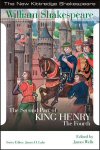
The Second Part of King Henry the Fourth
- Author: William Shakespeare
- Editor: James Wells
- Series: New Kittredge Shakespeare
- Series Editor: James H. Lake
- Publisher: Focus Publishing
- Publication Date: 2010
- Pages: 152
The Second Part of King Henry the Fourth picks up where the first part left off, focusing on Prince Hal’s quest for kingship.
James Wells is a professor of English at Belmont University.
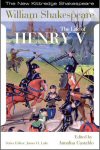
The Life of King Henry V is a historical play which follows the story of the King of England, Henry V. It covers the events before and after the Battle of Agincourt during the Hundred Years’ War in 1415. Audiences who saw the plays based on the life of Henry IV knew Henry V as “Prince Harry” or “Hal.” Here, the untamed boy they knew became a man and the conqueror of France.
Annalisa Castaldo received her PhD from Temple University and is an assistant professor of English at Widener. Her scholarly interests are performance studies and Shakespeare and popular culture. She is the fiction editor of the Shakespeares after Shakespeare reference work, which catalogues uses of Shakespeare in popular culture.
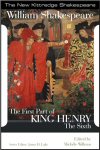
The First Part of King Henry the Sixth
- Author: William Shakespeare
- Editor: Michèle Willems
- Series: New Kittredge Shakespeare
- Series Editor: James H. Lake
- Publisher: Focus Publishing
- Publication Date: 2012
- Pages: 134
The First Part of King Henry the Sixth follows the death of King Henry V and treats the loss of England’s French territories and the political plots building up to the Wars of the Roses.
Michèle Willems is professor emeritus at the University of Rouen after 33 years of teaching English Renaissance literature. She has published extensively on Shakespeare, including the essay “Video and its paradoxes” in The Cambridge Companion to Shakespeare on Film.
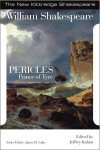
Pericles, Prince of Tyre
- Author: William Shakespeare
- Editor: Jeffrey Kahan
- Series: New Kittredge Shakespeare
- Series Editor: James H. Lake
- Publisher: Focus Publishing
- Publication Date: 2010
- Pages: 122
Pericles, Prince of Tyre dramatizes the journey of Pericles, which begins when he uncovers an incestuous relationship between the king of Antioch—Antiochus—and his daughter, forcing Pericles to flee for his life.
Jeffrey Kahan is a professor of English at the University of La Verne in California. He completed his PhD at the Shakespeare Institute of the University of Birmingham, England.
William Shakespeare (1564–1616) remains one of the most (if not, the single most) influential English writers. His works exist in every major world language and are still incredibly popular in theater, film, and literature. Some of his major works include Hamlet, King Lear, Othello, Macbeth, A Midsummer Night’s Dream, The Taming of the Shrew, and Romeo and Juliet. Over the last 400 years, but especially the last 200, his works have been reproduced countless times.
About George Lyman Kittredge
George Lyman Kittredge (1860–1941) was one of the most notable literary critics of the early twentieth century. After graduating at the top of his class at Harvard and receiving multiple Bowdoin prizes for his essays and translations, he eventually became an instructor there in 1888. His writings and teachings on Shakespeare, Chaucer, and American folklore helped establish the credibility of English as an academic pursuit. Kittredge, a celebrated professor and scholar, is remembered for his remarkable literary scholarship, wit, and tremendous influence in academia. His other major works include Observations on the Language of Chaucer’s Toilus, Professor Child, Chaucer and Some of His Friends, Chaucer and His Poetry, A Study of Gawain and the Green Knight, and Witchcraft in Old and New England.
About James Lake
James H. Lake received his PhD from the University of Delaware and is a professor of English at Louisiana State University in Shreveport. He has also been appointed to the faculty of the Greco Institute. He has served as director of the LSUS Joys of Learning Humanities Seminars for the Elderly, director of the university’s honors program and director of the LSUS Master of Arts in Liberal Arts program. He has served on numerous boards, including the Louisiana Endowment for the Humanities, the board of directors of the Noel Foundation, and the editorial board of Shakespeare and the Classroom. He has widely published on Shakespeare and film and edited the Focus on Performance edition of Christopher Marlowe’s Doctor Faustus.
Reviews
1 rating

Ken Maynard
4/10/2015
I was looking forward to this version, but I am very disappointed with the links. How is it helpful to have hyperlinks from the notes to the text, but no indication at all even of the existence of notes in the text? This is definitely not up to Logos standards, and I suspect the development was farmed out to someone else.